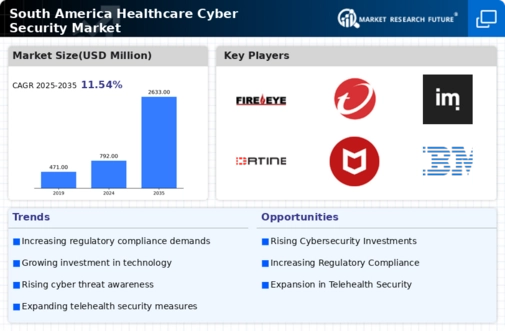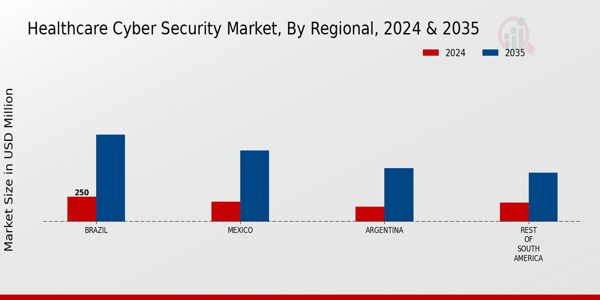The South America Healthcare Cyber Security Market is witnessing significant growth, driven by the increasing digitization of healthcare services and the essential need for protecting sensitive patient data. As healthcare organizations transition to digital platforms, the urgency to implement robust cybersecurity measures has become paramount due to the rising incidence of cyber threats and data breaches. Competitive dynamics in this market reflect a landscape where innovative solutions and strategic partnerships are crucial for companies seeking to establish a strong presence.
The landscape is characterized by a mix of established players and emerging entities, each contributing unique strengths and offerings tailored to safeguard healthcare institutions from cybercriminal activities. The ongoing focus on compliance with regulations and enhancing overall cybersecurity posture highlights the strategic moves made by industry leaders to address the specific challenges of the South American healthcare sector.FireEye has established a significant foothold in the South America Healthcare Cyber Security Market by providing advanced threat prevention and incident response solutions.
The company leverages its expertise in detecting and responding to sophisticated cyber threats, particularly those targeting the healthcare sector, which is vulnerable to ransomware and data breaches.
FireEye's strengths lie in its innovative technologies, such as its Mandiant services, which enhance threat intelligence and incident investigation capabilities. The company's commitment to supporting healthcare organizations in mitigating risks showcases its understanding of the regional challenges, making it a preferred partner for cybersecurity solutions. Moreover, FireEye’s professional services and continuous training programs bolster the cybersecurity readiness of healthcare providers, ensuring they are equipped to handle potential cyber incidents effectively.
Trend Micro has positioned itself as a key player in the South America Healthcare Cyber Security Market, offering a comprehensive suite of products designed to address the unique security requirements of the healthcare industry. Its solutions include endpoint protection, data loss prevention, and hybrid cloud security, catering specifically to the needs of healthcare organizations. Trend Micro's presence in South America is marked by strong partnerships and collaborations with local healthcare entities, enhancing its market footprint.
The company’s ability to innovate through research and development has facilitated the introduction of advanced security solutions that leverage artificial intelligence for threat detection and response. Additionally, Trend Micro has pursued strategic mergers and acquisitions to bolster its capabilities and expand its offerings in the region. By integrating advanced technologies and a deep understanding of the challenges faced by healthcare providers in South America, Trend Micro has established itself as a reliable cybersecurity partner for organizations seeking to protect sensitive health information.
























Leave a Comment